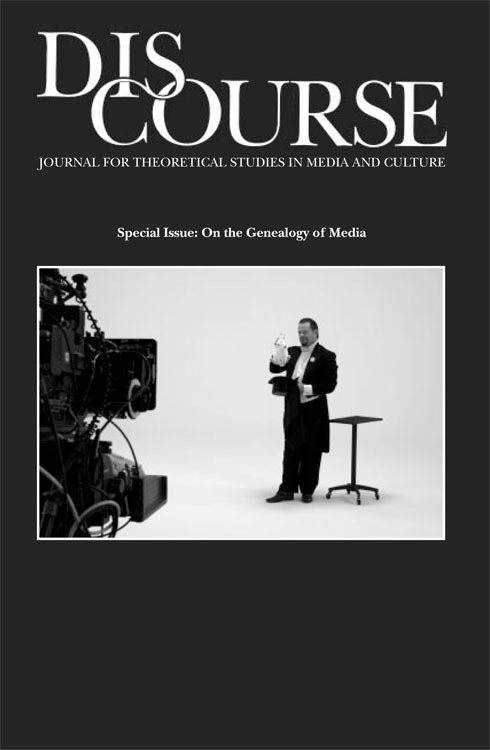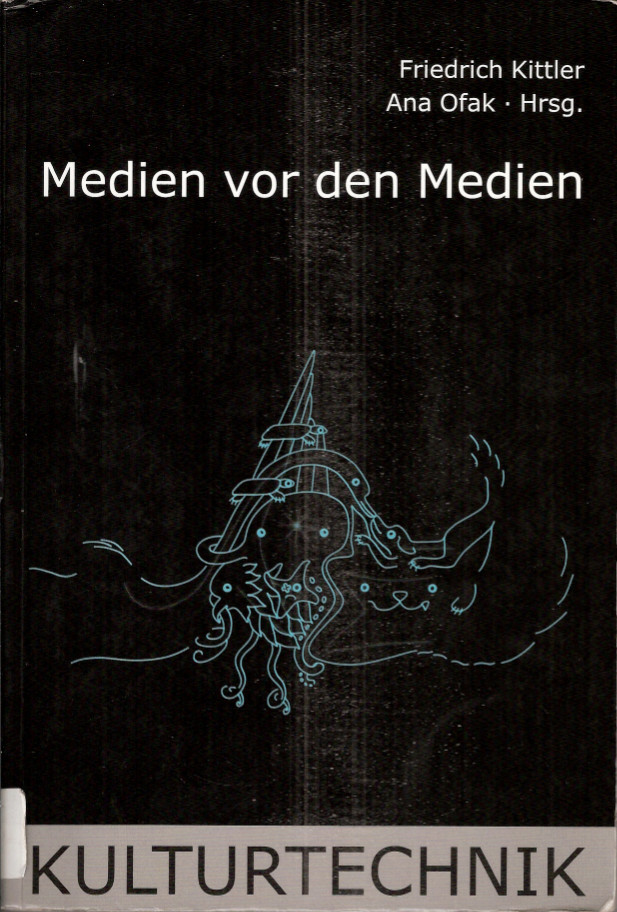Discourse 31(1/2): On The Genealogy of Media (2009)
Filed under journal | Tags: · media, media technology, media theory, mediality, philosophy, technology

“‘On the Genealogy of Media’ invokes a tradition for thinking about technology, which passes from Nietzsche through Heidegger and Freud. As a collection on media, however, these texts gathered together in this special issue include few Nietzsche readings—or even Nietzsche references—in their thread count. Indeed, Nietzsche is not typically considered a thinker of media technologies. But his genealogical interpretation of the Mass media as being on one uncanny continuum of valuation from Christianity to nihilism influenced, together with either Freud’s or Heidegger’s input, the media essays of Walter Benjamin as much as the media oeuvre of Friedrich Kittler. Following Nietzsche, then, a genealogy of media means, as in Heidegger’s questioning of technicity, that whatever technology may be it presupposes assumption of a certain (discursive) ready positioning for (and before) its advent as actual machines to which the understanding of technologization cannot be reduced. Freudian psychoanalysis views media technologies as prosthetically modeled after body parts and partings. A primary relationship to loss (as the always-new frontier of mourning where reality, the future, the other begin or begin again) is, on Freud’s turf and terms, the psychic ready position that is there before the event or advent of machinic externalities.” (from the Introduction)
With texts by Friedrich A. Kittler, Klaus Theweleit, Craig Saper, Gregory L. Ulmer, Rebecca Comay, Laurence A. Rickels, Barbara Stiegler, Tom Cohen and Avital Ronell.
Guest Editor: Laurence A. Rickels
Publisher Wayne State University Press, 2009
ISSN 1522-5321
182 pages
via Project Muse
Friedrich Kittler, Ana Ofak (eds.): Medien vor den Medien (2007) [German]
Filed under book | Tags: · architecture, cultural techniques, image, literature, media, media theory, mediality, music, music history, philosophy, sound, time

“Das Dazwischen (to metaxy) macht das Sehen und Hören, die Erkenntnis und die Liebe erst möglich – das überliefern uns Texte der Antike. Die Medien prägen so unser Wissen und verstören unsere Sinne seit jeher. In der deutschen Medienwissenschaft ist es fast zur Selbstverständlichkeit geworden, nur heutige oder doch neuzeitliche Medien zu erforschen. Nun geht aber schon der Begriff “Medium” auf die griechische Antike zurück. Eben diesem Sachverhalt sucht der Band Medien vor den Medien gerecht zu werden. Vom Feuertelegraphen zur Ontologie, vom Marienglas zur sakralen Lichtarchitektur und immer wieder vom Ton zum Bild. Da die Medien der Antike zunächst zur Sprache kommen, wird es möglich, Brücken zu anderen Wissenschaftskulturen und in jene Neuzeit zu schlagen, die unseren kurrenten Begriff physikalischer und technischer Medien prägt. Das Buch richtet sich an Philosophen, Kunst-, Kultur- und Medienwissenschaftler.”
Publisher Fink, Munich, 2007
Kulturtechnik series
ISBN 3770542843, 9783770542840
282 pages
via adorno77
Cultural techniques at Monoskop wiki
PDF (53 MB, no OCR, updated on 2020-4-20)
Comment (0)Matthew Fuller, Andrew Goffey: Evil Media (2012)
Filed under book | Tags: · algorithm, art, artificial intelligence, business, code, computing, data, database, event, governance, information, interaction, interface, knowledge, labour, language, machine, management, market, media, media theory, memory, military, networks, philosophy, political theory, politics, power, programming, software

“Evil Media develops a philosophy of media power that extends the concept of media beyond its tried and trusted use in the games of meaning, symbolism, and truth. It addresses the gray zones in which media exist as corporate work systems, algorithms and data structures, twenty-first century self-improvement manuals, and pharmaceutical techniques. Evil Media invites the reader to explore and understand the abstract infrastructure of the present day. From search engines to flirting strategies, from the value of institutional stupidity to the malicious minutiae of databases, this book shows how the devil is in the details.
The title takes the imperative “Don’t be evil” and asks, what would be done any differently in contemporary computational and networked media were that maxim reversed.
Media here are about much more and much less than symbols, stories, information, or communication: media do things. They incite and provoke, twist and bend, leak and manage. In a series of provocative stratagems designed to be used, Evil Media sets its reader an ethical challenge: either remain a transparent intermediary in the networks and chains of communicative power or become oneself an active, transformative medium.”
Publisher MIT Press, 2012
ISBN 0262304406, 9780262304405
235 pages
Review: Nicholas Holm (Media Int’l AU, 2013), Neural (2013).
Evil media on Monoskop wiki
PDF (updated on 2024-4-13)
HTML (added on 2015-8-28)
See also YoHa, et al., Evil Media Distribution Centre, 2013.
Comments (2)
